At one time, touting a showdown like 'Fitbit Vs. Apple Watch' would have seemed more than a little redundant. After all, the average buyer’s starting point for buying either of these high-tech wearables used to be very different. Fitbit, as the name suggests, started life as one of the best fitness tracker available, and it didn’t even have a watch function until the Ultra in 2011. Apple Watch, on the other hand, was pitched as a typical multi-featured Apple device and an extension of their owners’ iPhones. It included fitness-related sensors alongside many others at launch.
But now, Fitbit has increasingly added more functionality and usability to its models. Their integration with mobiles provides notifications and controls for Facebook, Spotify and email. And then there’s Fitbit Pay - the brand’s answer to Apple Pay. All in all, these additions make a model like the Fitbit Versa 4 or Sense 2 - both popular fitness trackers with GPS - a real option for those in the market for an Apple Watch.
However, the latter device has some seriously heavyweight tricks up its sleeve. As you’d expect from Apple, the number of apps and customisations available for download are staggering., This makes it a flexible all-around smartwatch with fitness features to boot. So, in the battle of Fitbit Vs. Apple Watch, is there one clear winner? Let the fight begin.
Fitbit Vs. Apple Watch in 2023
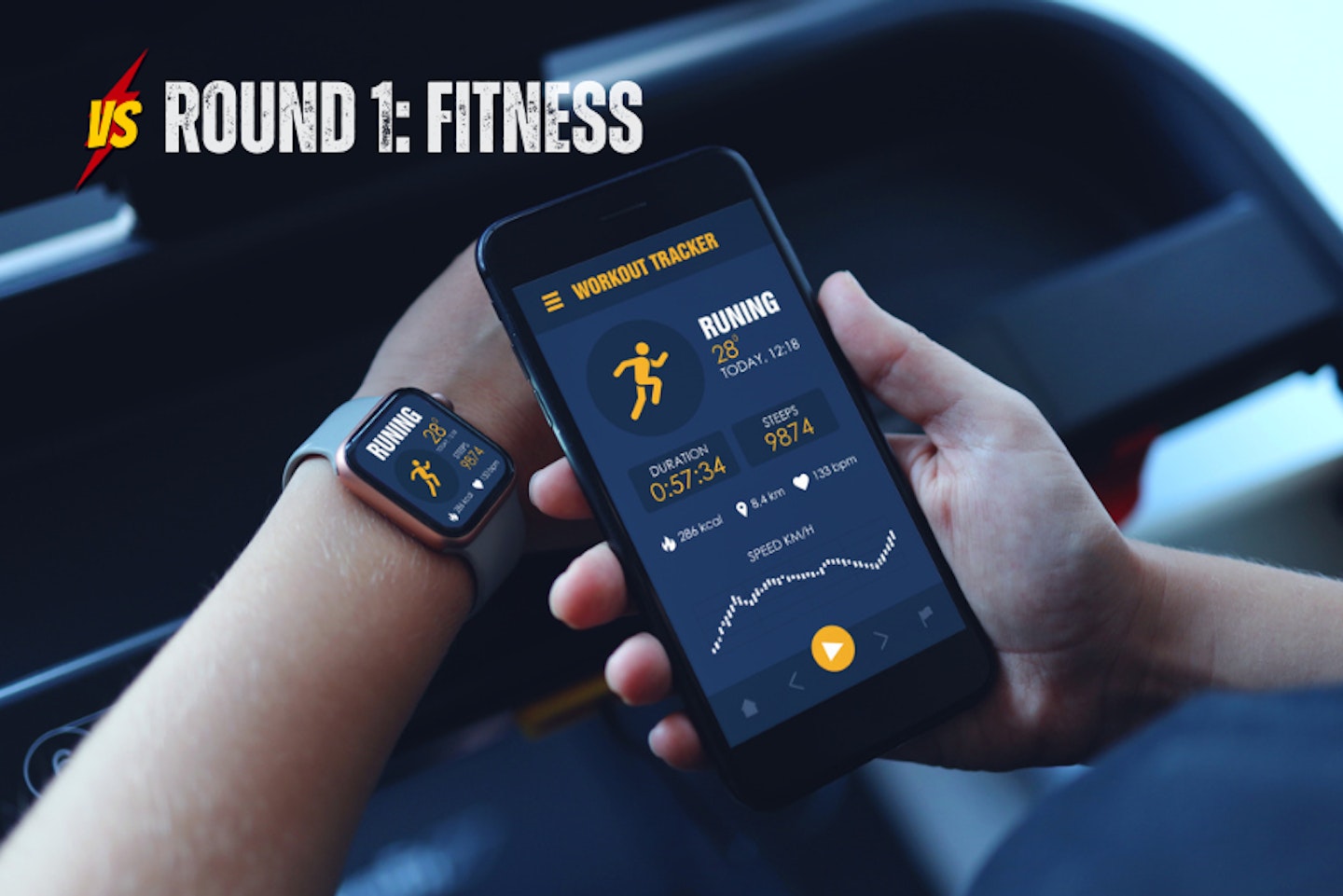
Round One: Fitbit Vs. Apple Watch for fitness
In our review of the Fitbit Charge 5 vs Fitbit Charge 4 we found that the Fitbit app is a perfect partner when it comes to fitness monitoring. It also provides plenty of motivation to get moving. With the Fitbit Premium membership, you can access your daily ‘readiness score’. By wearing the Fitbit for 14 days it will build a profile of your overall health and activity. It’ll then suggest the right type of exercise for you. But, if you’re not a subscriber, the normal functions of a Fitbit such as the Charge 5 or Versa 4 are intuitive to access using simple swipes from the clock or home screen. This is where the advantages of having a device that’s dedicated to fitness from the ground up come in.
So far in this round, the Apple Watch has been on the ropes a little. Firstly, being an Apple device, it’s very app-centric to use. So, accessing your fitness data requires a little more interaction than a Fitbit. However, depending on your app of choice, once you’re in, you’re going to have a lot of options. One small comeback for Apple, however, is the Fitness App. Much like Fitbit Premium, Apple offer subscriber access to Fitness+ which provides instructor-led workouts and more.
But, for our money, we prefer faster no-nonsense access to fitness data right from the home screen of the Fitbit. Fitbit won this round by a small margin.
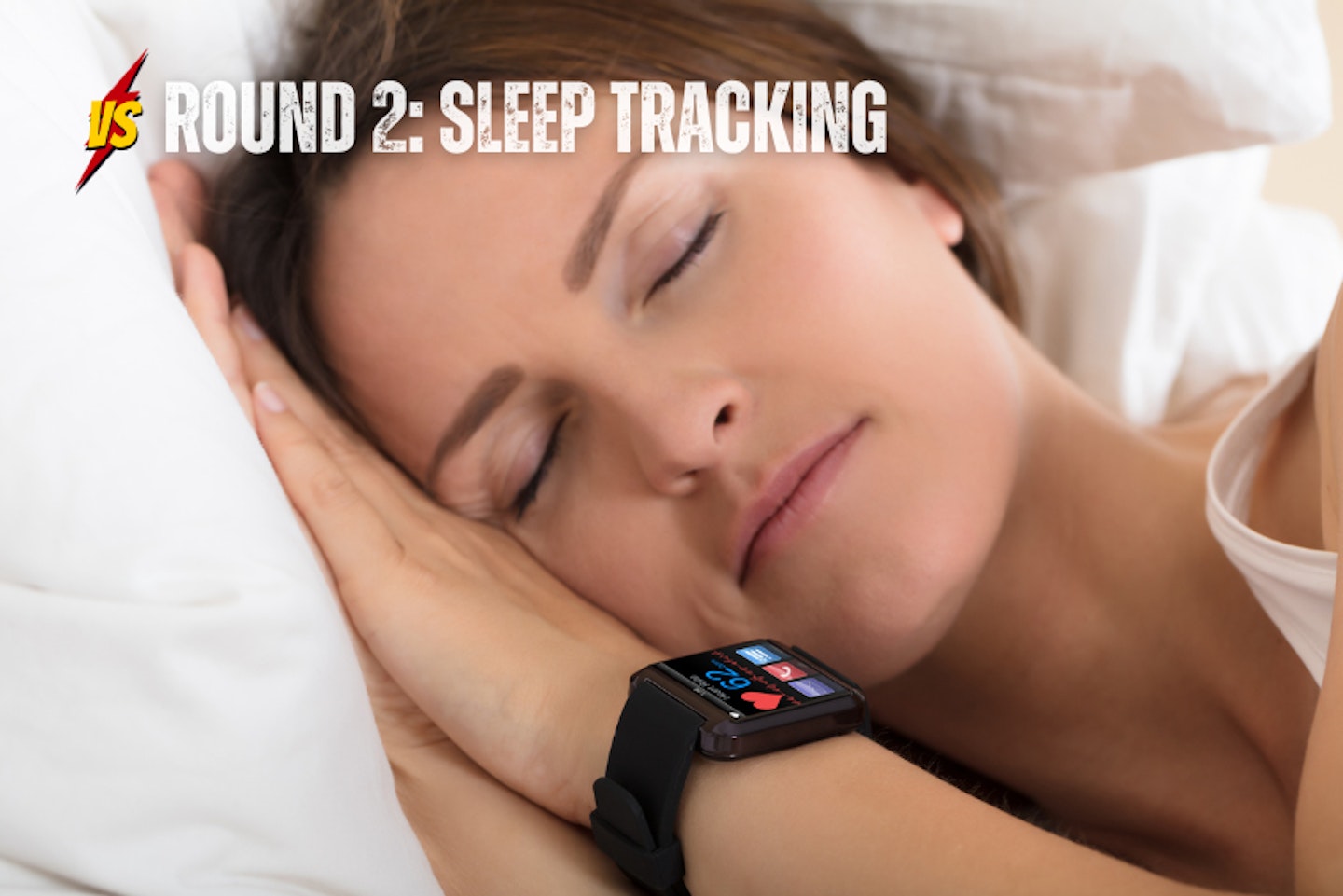
Round Two: Fitbit Vs. Apple Watch for sleep tracking
For many, sleep tracking is a useful insight into how well you recover from your daily activities. It can often signal other health issues. The algorithms used by both of these wearables are, naturally, different. But, unlike ECG monitoring, sleep tracking is a less exact science. That said, in general, the differences reported by users who have used both at once highlight no substantial discrepancies between them.
However, all that has changed with the latest WatchOS 9. It reportedly has a small accuracy edge over the latest Fitbit, but this is anecdotal. So, what this really comes down to is how the sleep data is presented to you, and which device feels better to wear while sleeping. Some will prefer a smaller, flatter Fitbit than the default square case of the Apple Watch - but they might do that at the expense of functionality.
This round is a tie, the Fitbit came out fighting but the Apple Watch countered, neither landing any major punches.
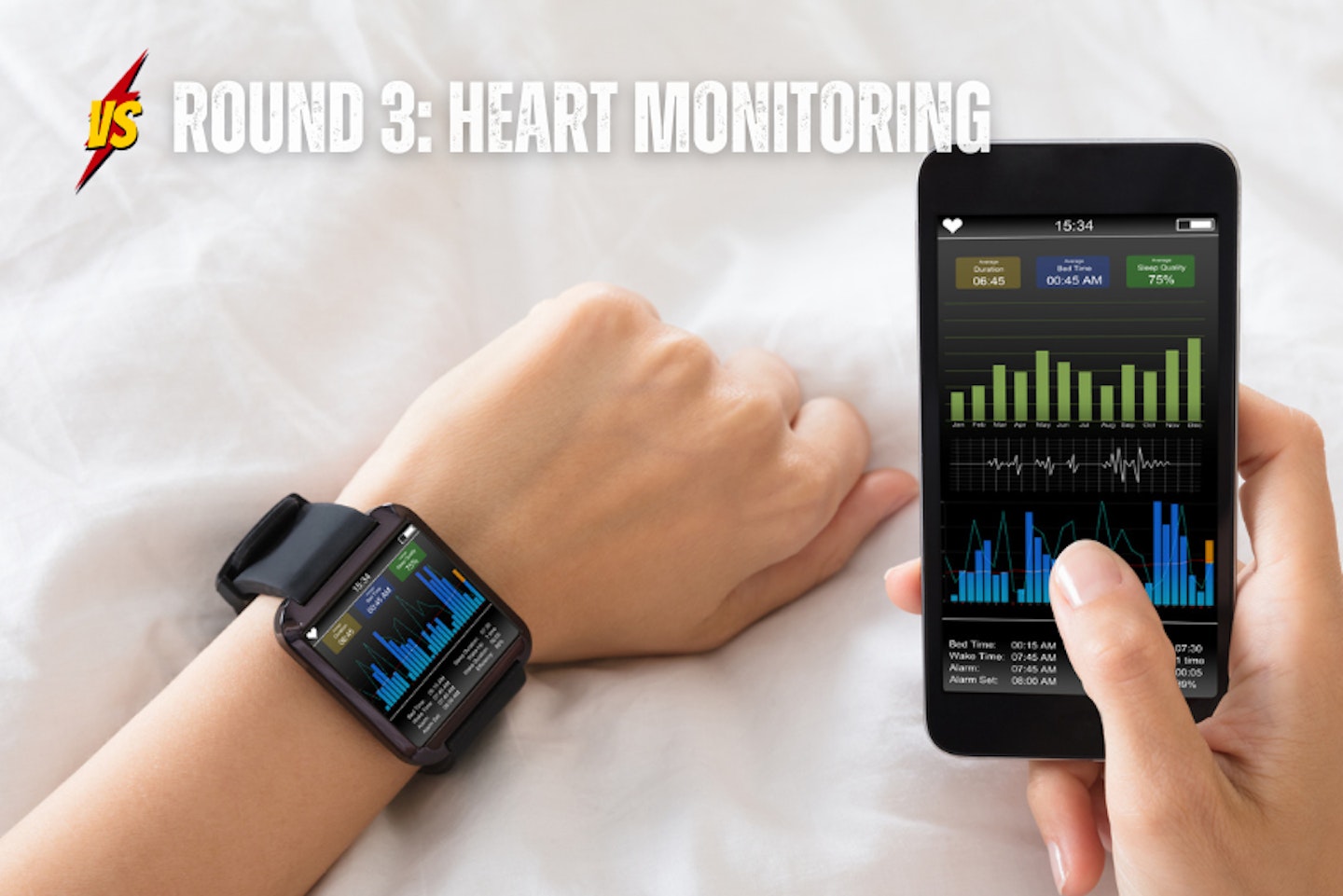
Round Three: Fitbit Vs. Apple Watch for heart monitoring
Heart monitoring is, of course, just one of many key health stats that anyone will need - but it’s probably one of the most useful. Whether it’s for fitness fans looking to monitor their exertion or recovery rate, or the health-conscious looking to keep an eye on their cardio data, it's crucial that the sensors used for this are accurate. ECG (electrocardiogram) sensors work by measuring the electrical signals in your bloodstream. Optical sensors, on the other hand, aren’t known for accuracy.
Both the Fitbit Versa and Apple Watch have ECG sensors and apps to report your heartbeat and rhythm and signal any irregularities. Both are also well renowned for accuracy and reliability, so the choice here is really down to the wider usability of the device.
With Round Three ending in another tie, it’s on to the next bout.
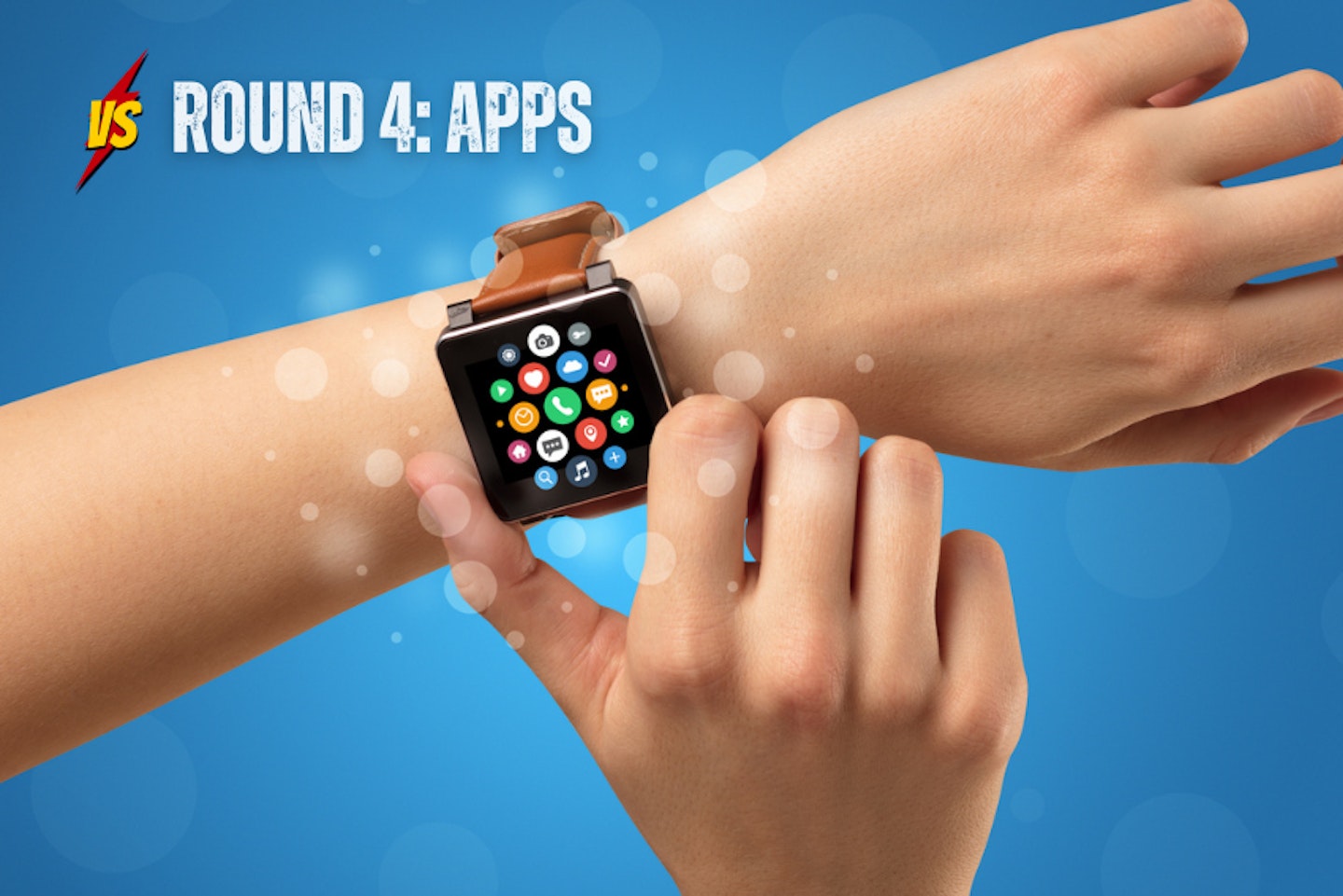
Round Four: Fitbit Vs. Apple Watch for apps
As both our contenders enter the ring for this penultimate round, Fitbit is looking a little underweight. But only a little. Its days of making slim, fitness-centric trackers are clearly behind it. With a tracker like the Versa 4 and the Fitbit App on your Android or Apple phone, you can access a range of apps. Since Google bought the company, there have been a few more apps that fit with the Google ecosystem.
However, as you’d expect, Apple’s App Store is a real heavyweight here. And if you count being able to make calls without a phone as an app, the Apple Watch also comes in a version with an internal SIM card. Not only can the Apple Watch hold over 2000 apps at once, but the selection in the App Store is huge.
Comparing that to a Fitbit Versa 4 that can only store up to 39 apps at once, we have a clear winner in this round. But it’s not a knockout. Remember, with great capabilities comes a bigger price tag - anyone looking for one of the best fitness trackers for kids will definitely favour the cheaper range of Fitbits; it’ll probably last longer on a child’s wrist than a chunkier Apple Watch. And on the subject of longevity…
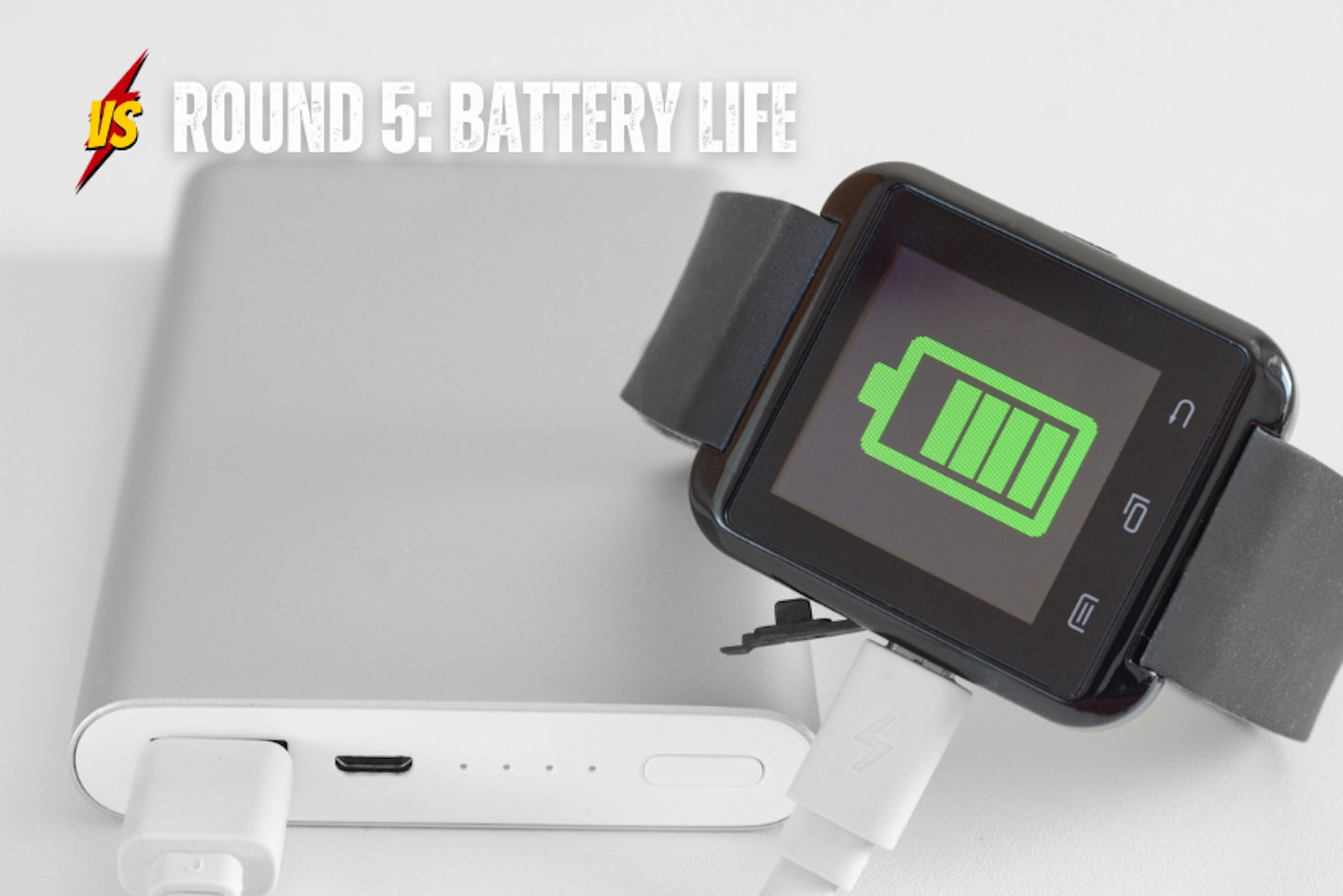
Round Five: Fitbit Vs. Apple Watch for battery life
Ding-ding. It’s the final round. Whereas Apple trounced the opposition in Round Four, this time Fitbit is up to some lightweight fancy footwork. Any previous owners of the Apple Watch will know that their device would spend almost as much time on charge as it would be on the wrist, but things have moved on since then.
As mentioned above, the downside of having a large colour touchscreen and all of those apps and sensors (not to mention the power-hungry GPS function) is that it’ll really eat up the battery. It’s claimed that the Apple Watch Series 9 (which also comes with a cellular function) can last up to 36 hours in low-power mode, and half that under average use. Sounds fine? Well, it’s not ideal for fitness fans, as low power mode disables background heart rate, blood oxygen and various notifications too.
The Fitbit Versa 4, however, can last up to a week without a recharge. Even with GPS turned on, users report at least two days of operation. And if you’re running low, you can get 24 hours of use on this for just a 12-minute charge. The Apple Watch requires around 90 minutes to reach 80% capacity.
So, with the sound of the final bell, Fitbit has claimed victory in the power stakes. Now it’s over to the judges for the final decision.
Fitbit Vs. Apple Watch in 2023: The winner?
Well, in a shock defeat for both the Apple Watch and the Fitbit, the real winner here is your fitness. The truth is that both devices now offer so much that there’s very little between them. If anything, we think that the way they’re marketed, price and various brand associations are the only real differences to base a choice on. Yes, there are clear winners when it comes to a few things, like battery life, price, and app selection; but these two gadgets are otherwise closely matched.
Fitbit will probably always be the preference of those whose primary focus is their fitness regime, and deciding which Fitbit you should choose is led by things like usability while exercising. The more active the user the more likely they’ll want to avoid losing, damaging or snagging a precious Apple Watch. Apple fans, however, will always gravitate to their favourite iOS-based brand, and enjoy all of the apps and integrations on offer. That includes fitness apps, which is why it’s probably the ideal fitness tracker for iPhone users.
So, buy the device that you like the look of, that fits comfortably, and works with your other devices and lifestyle. Take your time to weigh up the features you need first, and you can’t go wrong.
Best premium Fitbit

Fitbit's Sense 2 it's a perfectly formed piece of kit that is a worthy rival to the Apple Watch. From heart rate to stress management, this is easily one of the best Fitbits for accuracy and versatility in its data monitoring. If you're looking for a device to help you on your health improvement journey, this is a reliable Fitbit that pairs brilliantly with its companion app to provide you with as much data as you could want. Plus, it looks good while doing so, which is always a nice plus. As is having Amazon Alexa built-in.
Pros
- Durable and stylish design
- Detailed data from excellent and accurate sensors
- Includes GPS and up to 6 days of battery life
- Compatible with both iOS and Android
Cons
- Having the watch display always visible and GPS on drains the battery a lot faster
- Limited app selection compared to the Apple Watch
| Display: | 1.58 Inches |
| Sensors: | Multi-path optical heart rate tracker, Electrical sensor to measure skin conductance (cEDA) for stress detection, Multipurpose electrical sensors compatible with the ECG app and EDA Scan app, Red and infrared sensors for oxygen saturation (SpO2) monitoring, On-wrist skin temperature sensor, Ambient light sensor |
| Available Storage: | 4GB |
| Battery life: | 6+ days |
| Extra features: | Bluetooth, GPS, Gyroscope, Speaker, Microphone, NFC, vibration motor for alarms, goals, notifications, reminders, and apps, AMOLED display, Amazon Alexa Built-in |
- Customer review: "Great product at a very good price. It will track all the exercises you do, and tell you how many calories you burned. It lets you know how many hours of sleep you are getting. It also tracks your water intake and you can log whatever your eating. Fitbit has been making these watches for years now so know what they are doing. Great fitness tracker.."
Best premium Apple Watch
The latest and greatest Series 9 Apple Watch takes the cake when it comes to impeccable performance, a huge amount of fitness features, as well as some next-level health tracking options that are perfect for keeping an eye on sleep, blood oxygen levels, and even body temperature.
Pros
- One of the most stunning smartwatch designs on the market
- Fantastic health and fitness programs and plenty of accurate sensors
- Great variety of colours and customisation options
- Huge range of available apps
Cons
- Battery life is not as good as comparable fitness trackers
| Display: | 1.9-inch (sapphire glass), OLED |
| Sensors: | Blood-oxygen, ECG, high and low heart rate notifications, irregular heart rhythm notification, temperature sensing, ambient light sensor |
| Available Storage: | 64GB |
| Battery Capacity: | 18 hours (regular use), 36 hours (low-power mode) |
| Additional Features: | Digital Crown with haptic feedback, Swim-proof, water resistant up to 50m, GPS (cellular available), NFC, Midnight Aluminum Case with Midnight Sport Loop, Always-On Retina Display |
- Customer review: "Looking forward to upgrading to the Series 9. Brand new battery and new color (Starlight w/ Clay Braided Solo Loop). Display enhancements and new features are the icing on the cake."
Fitbit Vs. Apple Watch in 2023: FAQs
Is a Fitbit or Apple Watch More Accurate?
This will vary between models and also between sensors. For instance, an ECG sensor is much better than an optical one for heart rate monitoring. In this case, the best thing to do is read user reviews and look for feedback on the particular sensor you’re most interested in.
Does Fitbit or Apple Watch track steps better?
Unlike heart rate, step tracking is actually a little inexact no matter how you try to monitor it. That’s because everyone’s gait and range of motion are different. Most of us will be familiar with wearing some sort of tracker that tells us how many steps we need to take. You reach the end of the day only to find it’s registered a lot of steps when you were actually sitting down, having taken shuffling around as genuine steps. A combination of sensor inputs in the best fitness trackers will do a better job.
In general, though, users report that Fitbit step tracking is a little more accurate than Apple Watch.
Does Fitbit or Apple Watch track sleep better?
In much the same vein as step tracking, monitoring sleep is another algorithm-based approximation. As mentioned earlier, both the latest Fitbits and Apple Watches are consummate performers in this area.
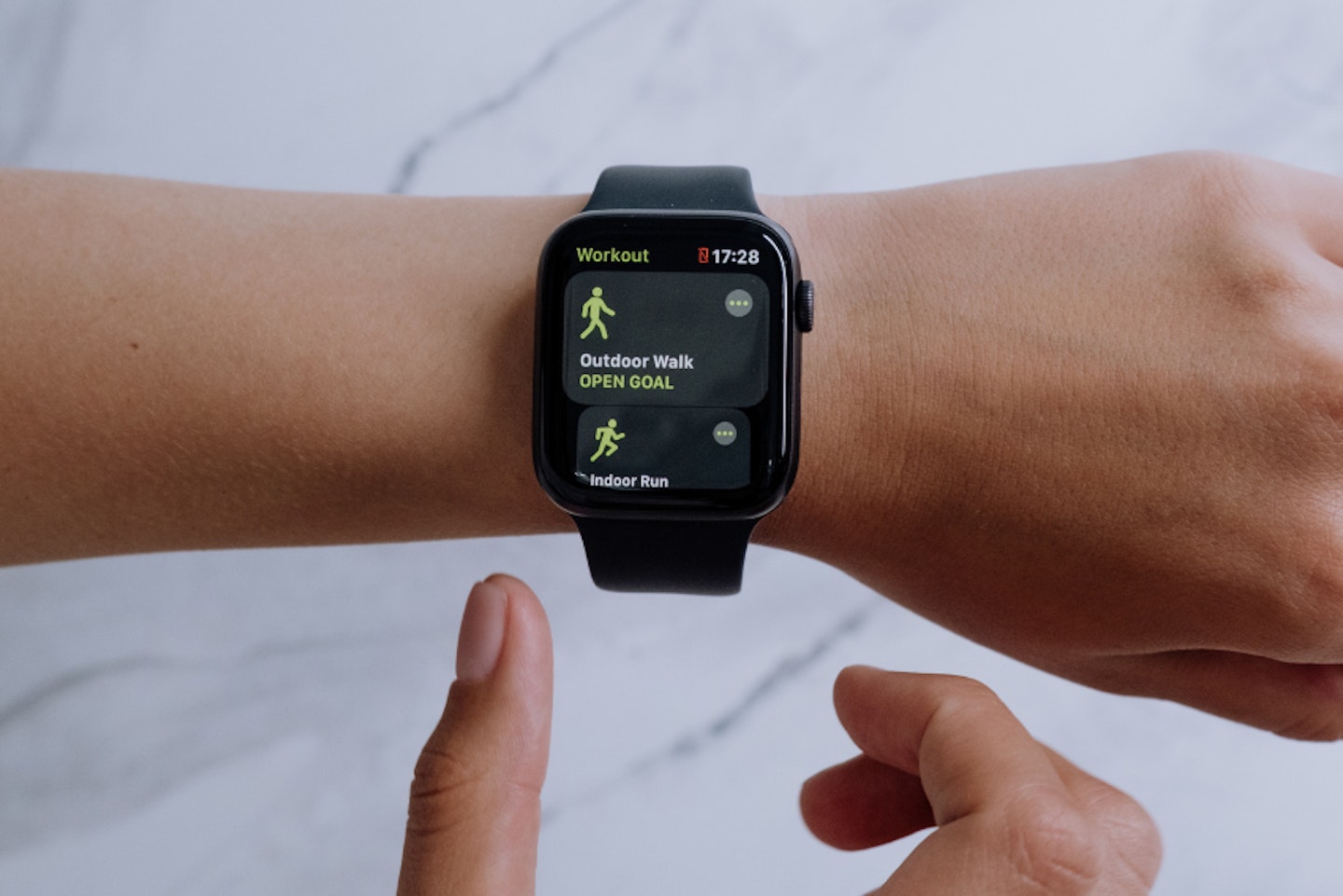
Fitbit Vs. Apple Watch in 2023: Jargon explained
GPS
This is the Global Positioning System provided by satellites to track your movements. Get a fitness tracker with built-in GPS if you want to be able to leave your phone at home and map your route.
Bluetooth
Bluetooth is a ubiquitous wireless connection technology used for everything from pairing keyboards with computers and streaming audio. In smartwatches and fitness trackers, it’s primary use is to pair the device with your phone which enables data to be shared with your apps.
ECG
An electrocardiogram, or ECG, is a method of monitoring heart activity by tracking electrical signals in the blood. This is then relayed to an app that can chart this data on a graph, and provide heart rate monitoring and warnings of any irregularities.
SpO2
Otherwise known as blood oxygen levels, this is especially important for monitoring your recovery after exercise. It’s a measure of how efficiently your blood can carry oxygen.
VO2 Max
Similar to SpO2 above, this is a measure of your general aerobic function - in other words, how fast your body can actually use that oxygen. Measuring this before and at the end of your activity can be a good measure of aerobic fitness.
Chris Duffill is a Tech Product Writer for What's The Best. He specialises in audiovisual, computing, and gadgets. He also writes for Yours.
Subscribe to the What’s The Best Newsletter to keep up to date with more of the latest reviews and recommendations from the rest of the What’s The Best team.
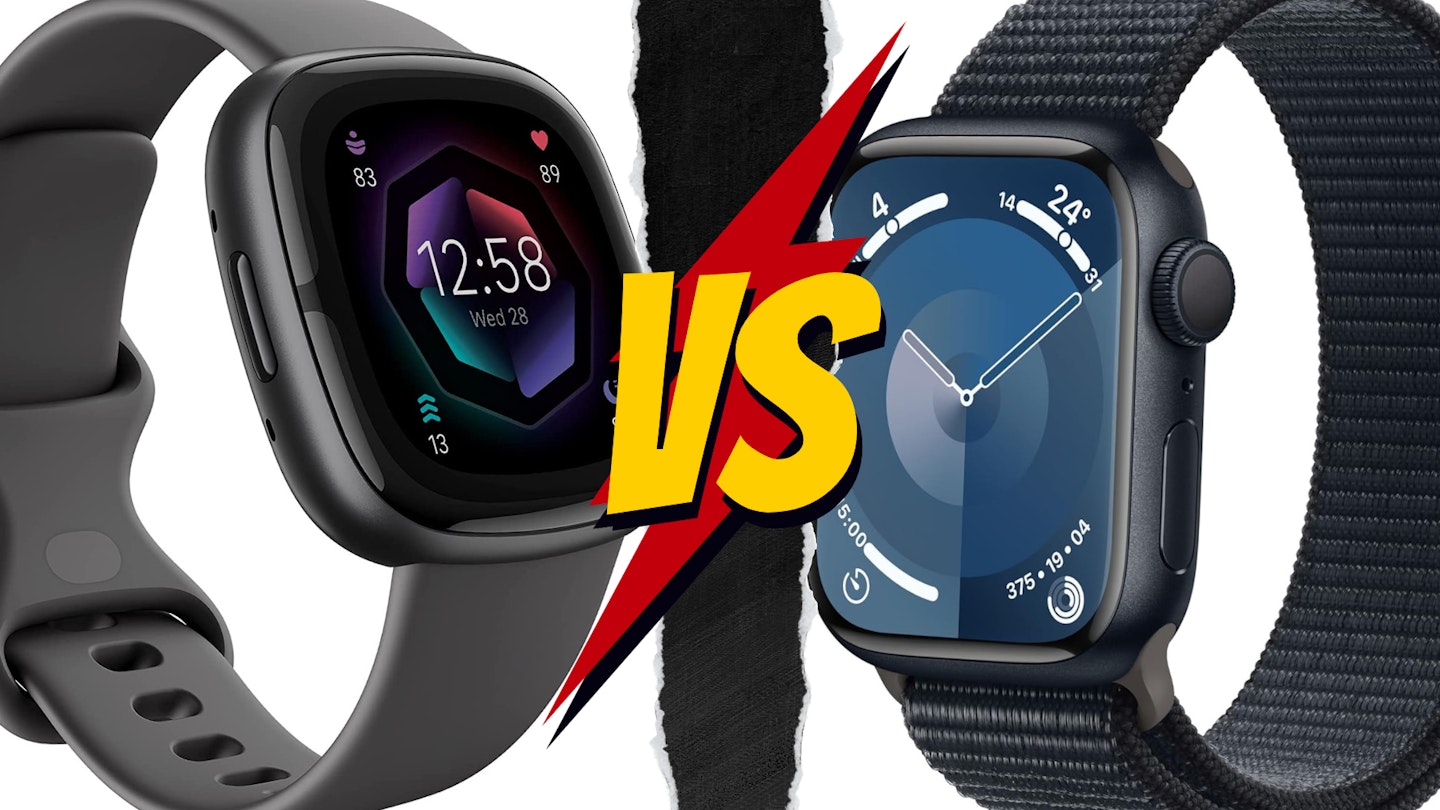
![Apple Watch Series 9 [GPS 41mm] Smartwatch](https://images.bauerhosting.com/affiliates/sites/8/2023/09/wpbauer-blocksbauer-product-card-item-imageID53495imageAltSonos-One-Gen-2-Smart-SpeakerimageURLhttpsimages.bauerhosting.comaffiliatessites9202208Sonos-One-Gen-2.png-2023-09-27T162927.549.png?auto=format&w=1440&q=80)